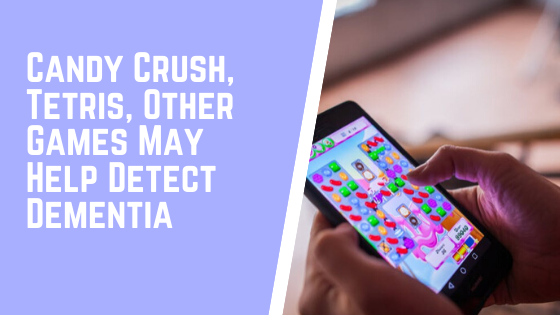
It can be easy to overlook the early signs of dementia. But what if your mobile phone could clue you into changes in your cognitive health, before you noticed them yourself?
New research conducted by scientists at the University of Kent suggests that popular mobile games may provide helpful information about users’ cognitive function.
The authors of the new study conducted a series of paper-based cognitive tests among 21 healthy participants. Then they asked participants to spend 10 minutes playing popular mobile games, including Tetris, Candy Crush Saga, and Fruit Ninja.
Using sensors built into users’ mobile phones, the researchers collected data about their taps, swipes, and rotational gestures during game play.

They found a clear link between the speed, length, and intensity of users’ gestures during game play and their cognitive performance.
Based on those findings, they concluded that popular mobile games may be used to identify changes in motor abilities among people with Alzheimer’s disease, traumatic brain injuries, or other conditions that can cause cognitive decline.
More research is needed
Using mobile games to test cognitive function might prove to be easier, faster, and more engaging than traditional paper-based assessments.
But according to Dr. John Torous, director of the digital psychiatry division in the psychiatry department at Beth Israel Deaconess Medical Center, more research is needed to replicate the results of this study and learn how mobile apps may help inform clinical care.
“These are interesting results, but it is difficult to makes claims around preventing cognitive decline when the study was done in healthy adults and thus not the target population,” Torous, who was not involved in the study.
“For these types of studies, replication is becoming the new gold standard,” he added.
Leveraging everyday technologies
In recent years, scientists in the fields of digital psychiatry and clinical informatics have become increasingly interested in the use of smartphone data to assess cognitive health and mental status.
Early findings suggest that the ways that we scroll, type, and talk on our phones may provide valuable information about our cognitive control, information processing, and mood.
That information might one day help patients and their doctors detect changes in mental status.
“I think there is huge potential in the use of everyday technology to detect early signs of cognitive decline,” Keith Fargo, PhD, director of scientific programs and outreach at the Alzheimer’s Association.

“We think there’s tremendous opportunity to use unobtrusive data collection routes or techniques to identify people at early stages, and we look forward to a time when that becomes more of a reality,” he continued.
In the meantime, more research is needed to validate the results of early studies and evaluate the potential use of mobile apps for assessing mental health and cognitive changes.
Questions also remain about the responsible management of data collected through smartphone apps. Who owns the data, how will it be used, and how will patients’ privacy be protected?
Early diagnosis is essential
It’s normal for cognitive abilities to decline as people get older.
But when someone develops cognitive changes that interfere with their daily life, it may be a sign of an underlying medical condition that requires treatment.
“I like to tell people that if you leave the grocery store and forget where you parked your car, that’s completely normal and is going to happen more frequently as you age,” Fargo said.
“But if you leave the grocery store and you get lost on your way home and find yourself in an unfamiliar neighborhood, that is cause for greater concern,” he continued.
Early detection of cognitive changes is important for providing effective treatment and limiting the loss of further function.
In some cases, cognitive decline is caused by medical conditions that are highly treatable, such as vitamin deficiencies.
In other cases, it’s a sign of Alzheimer’s disease or another form of dementia.
There’s currently no cure for Alzheimer’s disease, but medications are available to manage some of symptoms. Clinical trials are also underway to develop and test new treatments.
“If it is Alzheimer’s disease, you want to find that out as quickly as possible, so that you can potentially participate in a clinical trial,” Fargo said.
“There are medications in clinical trials today that, if those trials work out, could be truly disease-modifying drugs that would extend and potentially save lives,” he added.
Ask your doctor about testing
If you suspect that you or one of your family members might be experiencing cognitive decline, Fargo encourages you to let your doctor know.
He also encourages older adults to ask their doctors to conduct cognitive assessments as part of their routine check-ups.
Leave a reply










Leave a reply